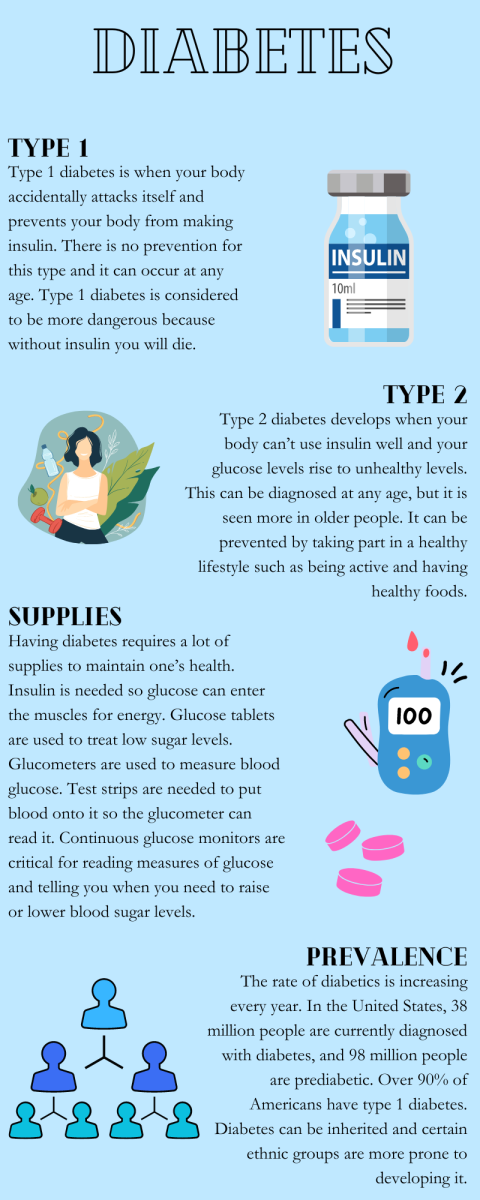Diabetes is a prevalent disease, affecting any age with serious complications. Every year, 1.2 million people are diagnosed with diabetes. Around 38 million people currently have diabetes in the U.S. and 2 million of them have type 1 diabetes.
There are two main types of diabetes, type 1 and type 2. Type 1 diabetes is when the body attacks itself by mistake, which stops your body from making insulin. You can get this type of diabetes at any age, and there is currently no prevention for it. Type 2 diabetes is when your body can’t use insulin well and your blood sugar levels fluctuate out of normal levels. It can be diagnosed as an adult, but more often when you’re younger. It can be prevented with specific lifestyle changes like losing weight and incorporating activity into daily life.
90-95% of the diabetes population has type 2 diabetes, while the other 5-10% have type 1. Apart from diabetes, there are 2.6 times more pre-diabetics than diabetics, reaching over 98 million. Prediabetes is where your blood sugar is at high unhealthy levels, but not high enough to be type 2 diabetes. Pakistan and French Polynesia have the most cases of type 2 diabetes.
Diabetes can be inherited through genetics, and certain ethnic groups are more likely to have a higher rate of diabetes. As someone who has many family members with diabetes, it can run through a family and come when you least expect it. Just like that, your life changes. Type 2 diabetes is more likely to be genetic. Near 80-90% of people diagnosed with it have family members who also have type 2.
The symptoms of type 1 and type 2 diabetes range from uncontrollable bladders and dehydration to unwanted weight loss and blurred eyesight. Because these are so common with other sicknesses, diabetes can be overlooked. Across the world, a little under half of the people with diabetes are undiagnosed. Diabetes can go undiagnosed for years unless a doctor takes a sample to check for blood glucose. Six of my family members went undiagnosed for years because they live in third-world countries, and the effects were detrimental.
Maintaining health for a diabetic is extremely expensive. People with diabetes have medical expenses up to $19,000 and $12,000 of that is attributable to diabetes. They could spend up to $4,600 out of pocket a year on diabetes supplies such as glucometers, insulin pumps, infusion sets, test strips, syringes, and sterile products. Up to 1.3 million Americans can’t afford the needed supplies for diabetes.
Along with that, mental health can be seriously affected with this disease, feeling as if you are too different from other people and that you are not able to do things that other kids can in order to keep your health good like eating super sugary foods all the time and running around for hours.
There are programs such as the Patient Advocate Foundation which helps serve people with diabetes. In certain instances, some can even qualify for a disability living allowance. Even when you try to stay healthy as a diabetic, you are more prone to getting ill, which can lead to more doctor visits and other serious complications. Getting surgeries or being put under anesthesia can cause dangerous illnesses such as ketoacidosis or circulatory failure.
Although diabetes is common, it is not easy to live with. As someone who has many family members with diabetes, learning more about it and contributing to funds can help make a loved one just a little more safe and appreciated.








